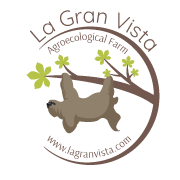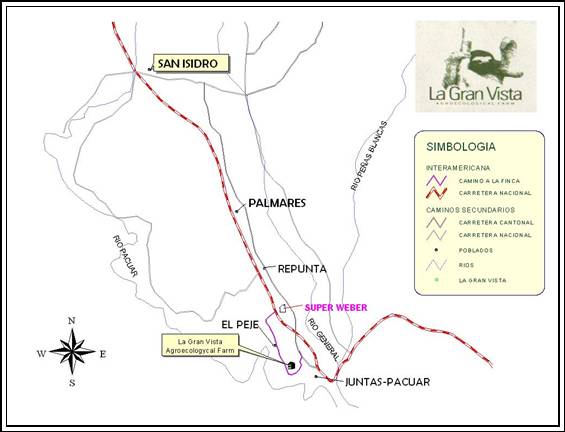| Project Overview
Contact Information: Local Contact:
Background of the Organization: With stunning views of El Valle de General and Costa Rica’s tallest mountains, including Mount Chirripo, La Gran Vista Agricultural Ecological Farm is well named. It is situated in the county of Perez Zeledon, three hours south of San Jose, the capital of Costa Rica, in an area of outstanding natural beauty. Protected forests, sublime beaches and fabulous waterfalls can all be found nearby. Finca La Gran Vista was established on January 16, 2001, as a non-profit project with the aim of spreading awareness of environmentally sustainable agricultural methods to other farmers in the region. It is intended to provide an example for other farms of how the following practices can be employed successfully:
The manager of the project, Donald Villalobos, is an agricultural engineer who has worked with the Ministry of Agriculture for over 31 years and has seen first hand how traditional farming practices have contributed to habitat degradation in Costa Rica. To bring about change in the way agriculture is practiced, it must be demonstrated to the farmers that the new practices are superior to those currently in use. In an effort to foster this kind of change, Donald has set about creating an ecologically friendly farm that uses the land sustainably; in doing so, he has virtually eliminated soil erosion on his property. The finca receives volunteers regularly throughout the year from across the world, particularly from the USA, Canada, England and Australia. Their involvement is invaluable to the development of the farm and to the fulfillment of the main goals Donald has set. Over the years the finca has been fortunate enough to receive volunteers from English and American companies, foreign students at Spanish language schools in Costa Rica and ecology students. Notable recent achievements include constructing an electric fence, digging a frog pond, excavating a special site to produce natural biogas, replanting grass, constructing a spacious living area for volunteers at the front of the main building, constructing terraces, planting trees and repainting the school and church in the community, El Peje. The farm is run by a family of five: Xinia, Donald, Max, Larry, and Terry. Finca La Gran Vista is twelve acres in extent, and accommodates horses, chickens, ducks, medicinal plants, fruit trees, grass for forage, several crop species, spring-water wells, an area of rainforest, red worm composting for soil regeneration, and a fish pond. Background of the Project: Soil erosion is a serious problem for farmers in tropical regions. Farming practices that are inappropriate to the local climate and ecology often result in loss of soil fertility, to the extent that the land can no longer support agricultural use. When this occurs, the farmer typically clears an adjacent area of rainforest to grow his crops. Once the forest canopy has been cleared, the bare topsoil is vulnerable to being washed away by the wet season’s heavy rains, and the cycle of soil loss is repeated. In addition to degrading the terrestrial habitat, ecologically inappropriate farming practices also contribute to the destruction of coral reefs, since the eroded topsoil is eventually carried by rivers to the sea. The silt settles on the reefs and literally smothers them. The main aim of this project is to provide a working example of a farm that operates in a sustainable manner, removing the need to clear new areas of forest. Each volunteer task has been specially chosen and rigorously prepared to help ingrain the values of the farm and the ethos it engenders – that is, maximizing farm production in a highly sustainable, ecological way. Specifically, the goals of the project are:
Information about the Zone: The county of Pérez Zeledón has a population of 200,000 and its main city is San Isidro de El General. For information on species you may come across in the zone, please refer to the list of mammals, butterflies and birds attached (Annex 1)
Map showing where the La Gran Vista is:
Volunteer Work: The work will include construction, feeding the animals, planting seeds, soil conservation, maintenance of medical plants, producing and using organic fertilizer, maintaining the spring-water wells, and harvesting crops. Each morning you will find a whiteboard with the day’s tasks, which will be assigned by Donald. The work is at times challenging, but volunteers have invariably found it stimulating and rewarding. Please respect the instructions of the staff, and leave tools such as shovels and hammers clean and in their correct places inside the tool shed, along with boots or work shoes. There are several projects on which the volunteers will be working while at Finca La Gran Vista. They include: • Soil remediation. The pasture area on the farm is heavily degraded, with little natural vegetation and substantial areas of bare soil. Unwanted grass species currently there will need to be removed, the soil prepared for grass plugs (lots of digging), and then the plugs will need to be planted by hand. In addition, Donald installed an electric fence, which, apart from the wiring, was done by the volunteers. Every so often, volunteers will need to help trim down any weeds tangled in the wires and to restore a safe distance between the wires, to prevent them from intertwining. Moreover, each year, volunteers sow seeds in patches of soil where plants don’t already grow. Upon arrival in Costa Rica. Once in San José, volunteers take a three hour bus to San Isidro ( Tracopa Company), stopping next to the Super Weber supermarket in a village called El Peje de Repunta (15 minutes out of San Isidro). From there, volunteers will be picked up and driven to Finca La Gran Vista. In terms of trips into town from the finca itself, the local bus runs every hour to and from the nearby town of San Isidro, from a bus stop twenty-five minutes walking distance from the project site. Coming back from the town, volunteers in the past have found it easier to take a taxi all the way back up to the finca (about 6000-7000) colones); the bus back is a cheaper option, but the walk from the bus stop is a good 40 minutes uphill. The volunteers will stay with the host family in a rustic cabin. There are four rooms set aside for the students, with two bunk beds in each. Also there are open places to set Camping Tents with room for six people or more. Another set of cabins is soon to be constructed at the edge of the forest, two hundred meters from the main finca building. The finca is generally well-equipped, with hot showers and electric power sources in bedrooms. The volunteers are expected to keep their rooms clean, including the bathroom and kitchen. Xinia will provide cleaning materials. Guests are welcome to use the washing machine, as long as they are careful not to overload it. Xinia can provide the soap, but please use it sparingly. All waste can be recycled (apart from sanitary waste- please use the bin provided in the bathroom for this). Toilet paper must go into the bins marked “papel” in the bathroom, not down the toilet. The host family will cook all the meals except on the days off. The meals will consist of simple Costa Rican food, and will include a lot of cooked rice and beans. Volunteers can even learn how to process, and help drink, La Gran Vista’s very own house wine, a sweet concoction that always goes down smooth. With the large number of guests staying, Xinia will need a little help in the kitchen, and so each volunteer will help with food preparation for a day. This will give them a chance to practice their Spanish, learn a bit about typical Tico cuisine, make frescos, and possibly cook with biogas. We ask that everyone help with the dishes after lunch and supper- it goes much faster with a little bit of help. The best and fairest way to manage this is for the group leader to organize small groups of three who take it in turns to wash up after each meal. If you have special dietary needs, please let the La Gran Vista office know ahead of time. Please remember that vegetarianism is not the norm in Costa Rica, but simple requests for no meat can easily be honored. Don’t expect veggie lasagna or soymilk, but you will enjoy lots of salad, fruit, eggs, cheese, rice and beans. Volunteers are welcome to store their own food in the refrigerator, but please remember that space is limited. Banks, stores and communication (e.g. internet, public phones): There are many activities for students to do in their free time, from relaxing in a hammock, to enjoying the local scenery and exploring the local area. Donald organizes regular tours to various sights of interest, including the beaches on Dominical and Uvita; horse riding, taught by Donald’s youngest son Terry; and visits to the nearby waterfall and beach. At the local school, a ten minute walk away, there is a decent-sized football pitch with proper metal goalposts where ‘mejengas’ (huge, frantic games of football, usually about twenty-a-side) often take place. Volunteers are warmly welcomed to join in whenever there’s a game (you can see the pitch, and thus when children are playing, from the finca!) Costa Rica has very good health services, and the nearest clinic is in Palmares, about ten minutes away. There is also a large hospital about twenty minutes away, in San Isidro. Temperatures range from 87-97° F during the day, dropping to 82-86° F at night. Expect daily showers in the afternoons during your stay. All students must carry a comprehensive medical insurance policy; in addition, participants are encouraged to consult a travel clinic and/or their personal physician to discuss recommended immunizations for Costa Rica. We encourage every participant to be up to date on his/her tetanus shot (good for 10 years). La Gran Vista has never had problems with malaria or cholera of the area where the projects are located, though these are both present in Costa Rica. Dengue is most prominent during the rainy season. The U.S. Center for Disease Control provides tips about how to stay healthy while in Costa Rica, as well as recommendations for immunizations (www.cdc.gov ). One of the most common, yet preventable, ailments of visitors to the tropics is dehydration. Water is treated in Costa Rica; however, some people may experience slight stomach upset when they first arrive in the country. To be safe, you may want to buy bottled water or boil water for your water bottles in the mornings or at night. Whatever you do, just be sure to drink lots of water every day to avoid getting dehydrated, especially on working days! Should you get diarrhea, please inform the coordinator immediately- usually the problem resolves itself in one or two days. Wash your hands frequently, rest as necessary, and drink lots of liquids. The sun is another important health factor to consider- you can burn in the tropics even on cloudy days, so always use sunblock (SPF 30+) and wear a hat, and drink plenty of water. Moderate to severe sunburns are not uncommon among visitors and volunteers, yet they are completely preventable. Please be cautious in the sun: a severe sunburn can quickly ruin your trip. Blisters and mild abrasions are common when doing outdoor work. Mosquitoes are present at dusk and into the night, so use repellant after sunset. You may also want to sleep under a fine-meshed mosquito net. All participants are strongly advised to use a flashlight when walking anywhere at night, as a precaution to avoid stepping on a snake. While working, boots (not sandals) should be worn. If you are allergic to insect bites or stings, work in long pants and long-sleeved shirts. Volunteers will need permission from Donald to use machetes or electrical machines. Always follow all the safety protocols and guidelines. Donald’s eldest son Max has a Red Cross First Aid certificate, should there be an emergency on the farm. Bring a positive, hard-working attitude. Volunteers must have their own comprehensive medical insurance, plus some sort of travel insurance, including a cancellation policy. No alcohol is allowed on the farm; if you go out into the community to have a beer, please respect the wishes of your project host family and don’t drink to excess. Smoking is allowed only in designated areas outdoors. The community has only a limited amount of water, so please use it sparingly (i.e. one shower per day, one laundry wash per week). What to Bring: Please note: Electrical appliances (eg. Cameras, MP3 players) can be charged up at power sources in the dormitories, so do bring any necessary chargers and electrical adaptors you may need.
Annex 1 The following are species of mammals in the area:
The following are some of the birds you might see in the area:
|
If you want to know more about our project,
see our PHOTO GALLERY,
click here to start.

Contact us:
Phone: (506) 8924 8983 ask for Donald Villalobos.
lagranvista@hotmail.com
lagranvistacr@yahoo.com
Address:
El Peje de Repunta,
Pérez Zeledón,
San José, Costa Rica.

